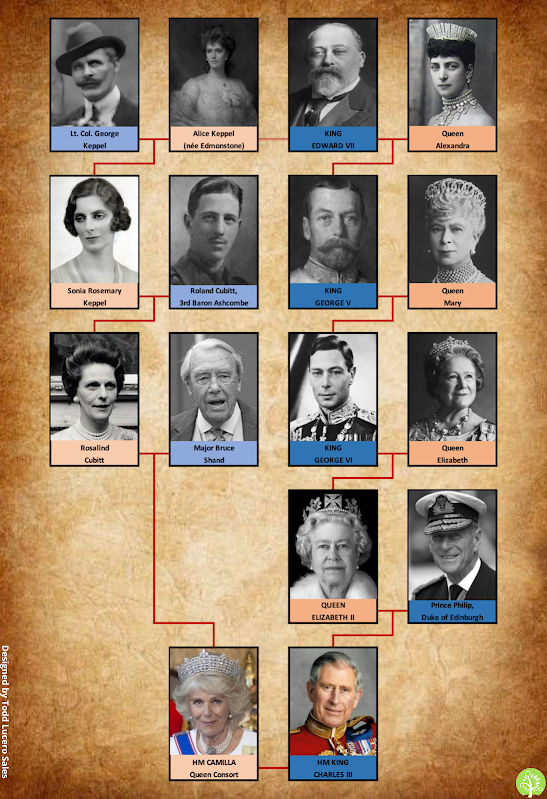(I ask for indulgence from my usual readers to allow me to write about something that is not about Filipino genealogy. This article is nevertheless about genealogy, still, albeit about the British royal family.)
The death of Her Majesty Queen Elizabeth II has brought a similar outpouring of grief throughout the British realm and the world, similar to or even more than the one we saw when Diana, Princess of Wales passed away tragically in 1997. Even though there had been multiple earlier rumors of Queen Elizabeth II's death and she was clearly old enough for everyone to anticipate her death, many people were still unprepared for the awful news. In particular, I wasn't ready for it. I have idolized Her Majesty since I was 13 years old. In 1993, when I heard about the union of Japan's then-Crown Prince Naruhito and Masako Owada, my love affair with royalty officially began. I searched the internet for everything regarding royal families since I have a natural curiosity and I find the idea of the monarchy to be particularly fascinating. My prize for reading through our collection of encyclopedias at home was a lengthy piece on the British royal family. Since then, I've gained expertise in the area. And, as Mike and Gavin, two of my fellow enthusiastic monarchists, would remark, individuals who are interested in genealogy, like we are, are inherently more royalist than the king (to be more royalist than the king). Given that I live in a republic, very few people understand my enthusiasm for the monarchy, which is the root of my love for genealogy and history.
At the center of this renewed attention and interest in the British monarchy is the new King, His Majesty King Charles III. Already, thousands of memes and videos have been posted online, from harmless poking fun at Charles from being "unemployed" for the past 70 years until suddenly becoming king, to blatantly comparing Diana to King Charles's consort, Camilla. More than anything, moralists are once more pointing out the affair Charles had with Camilla before later marrying her. Naturally, people who are unfamiliar with the entire story feel smug that they are right when in fact the story of Charles and Camilla has been destined generations ago. It is even suggested by some writers that when Camilla first met Charles in the 70s she told Charles: 'my great-grandmother and your great-great-grandfather were lovers. So, how about it?' or something to that effect. Intriguingly, the genealogical comment was accurate.
Whatever the truth about that first encounter, the genealogical connection between the two was well-established. It was indeed common knowledge within the royal family and the circle they circulated with that Camilla's great-grandmother, Alice Keppel (nee Edmonstone) met then-Prince Edward (later King Edward VII) in 1898 and became his mistress. While King Edward had a playboy reputation, Alice Keppel was unique in her position as the King's mistress because most people not only tolerated their affair but even approved of it. People said that the King, who had a temper, was a much better person when he started seeing Alice Keppel as she was the only one who could calm him down. Alice's husband, the Hon. George Keppel, would discreetly be out of the house whenever the king visited Alice at her home. Best of all, Queen Alexandra, wife of King Edward, was not only tolerant of but approved of Alice Keppel. In fact, she was with the Queen in 1910 when the King was on his deathbed. Some might not really understand the arrangement, but this was from a different era and when seen from the lens of that generation we know that such things were common and accepted.
Almost a hundred years later, Alice Keppel's great-granddaughter, Camilla Shand, later Camilla Parker-Bowles, would meet Prince Charles, the great-great-grandson of King Edward VII and pick up where their ancestors left off. While their relationship had many challenges along the way, and almost everyone disapproved of it, as soon as the impediments were gone and Charles was finally able to marry Camilla, things started to get better. Camilla was able to quickly adapt to royal life and, just like her ancestor, she never called attention to herself. She followed royal protocol and earned the respect of the Queen. Because of this, instead of the original agreement that she would not be called Queen consort when Charles would accede to the throne, the Queen in February this year made it officially known that she wished for Camilla to become Queen Consort, instead.
The new King and Queen were destined to meet, that much is clear if one looks at their family tree. And while their ancestors were not allowed to be together in an official capacity, they now fulfilled the relationship that their forebears were meant to have.
Once again, genealogy comes into play to explain something generations in the making.


Writing law assignments always felt daunting, particularly when I had to understand complex statutes and legal principles. Thankfully the Law Assignment Writing Help made everything more manageable. Rapid Assignment Help provided excellent support. All assignments were thoroughly researched, original, and delivered promptly. Their guidance improved my grades and made meeting tight deadlines much less stressful.
ReplyDeleteOn a separate note the UK Construction 2025 Strategy encourages more efficient construction, lower carbon output, and improved project delivery. Studying these aspects helps students understand how the industry is adapting to meet ambitious long-term goals.